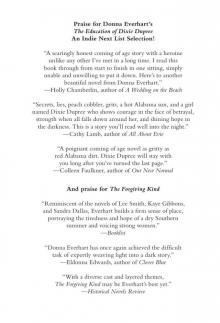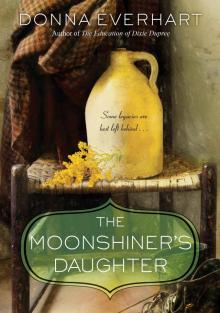- Home
- Donna Everhart
The Moonshiner's Daughter Page 5
The Moonshiner's Daughter Read online
Page 5
After supper Daddy got up from the table and I quickly washed the dishes, staring out the window as he backed Sally Sue out of the shed and came down the hill. Merritt went out and got in the back, sat on the fake seat concealing the jars of liquor directly beneath him. They waited on me, the engine grumbling as if it wasn’t used to idling. I dried my hands, went outside, and got in the front on the passenger side.
Daddy commented, like I cared.
He said, “Got us a full load tonight off Blood Creek earlier this afternoon. Y’all done real good.”
That meant the fake gas tank was full too. The delivery would hopefully be over and done with quick, like most of them. I leaned forward to fiddle with volume on the radio, tuning into WKBC. To my disgust they were playing “White Lightning” by George Jones.
I started to shut it off, but Daddy said, “Now that’s what I call good timing. Turn it up!”
I rolled my eyes and did as he asked, listening to George wail and carry on about making shine. He glorified it. Daddy’s fingers tapped the steering wheel in time to the song, the radio the only sound except the slap of Merritt’s baseball into the palm of his glove coming from the back seat.
We headed toward the obscure back roads where nothing except an occasional house, pastures with cows, or a tobacco barn broke up the landscape. The top of Shine Mountain rose above all others, tall enough to see as we drove south. Soon we turned onto Lore Mountain Road, where the revenuers had been spotted. Daddy obeyed the speed limit, keeping his eye on his side view and rearview mirrors. He motioned for me to turn the volume down. A sliver of the orange sunset leaked through the trees every now and then as dusk created shadows in the creases of hillsides. Sharp curved switchbacks made the road appear indecisive, as if it wanted to first go left, then right. We finally came to a little stretch of straightaway.
Daddy said, “Ain’t nothing like a little evening drive.”
It was like him to try and turn liquor hauling into any old ordinary pastime. I didn’t bother to answer. His window was down halfway and cool air circulated inside the car. The sun was soon gone altogether, and with the veil of night over us, I leaned my head against the back of the seat, occasionally glancing at my side view mirror. At least if I had to be involved, obscurity was always comforting. We descended into one of many hollers, and as we came to the bottom of the hill I saw the flash of headlights in my side view mirror.
I said, “Somebody’s behind us.”
Merritt spun around in his seat and looked out the back window.
He said, “Sure is.”
Daddy kept his speed, and we began to climb again.
He said, “It don’t mean nothing.”
He kept a look out though.
We lost sight of the car in the curves, but soon as we came to another stretch where the road went straight, Daddy said, “They’s closer.”
He accelerated a bit, and Sally Sue’s engine responded. We went along as quick and effortless as the current of the Yadkin River. He could put plenty of distance between us and whoever was back there without really trying. All he had to do was press on the gas a bit more and that would be that. When the other car held the distance, and then came closer, Daddy kept looking in his rearview mirror.
He said, “Getting closer,” as calm as if he was browsing the newspaper and had run across an article of interest.
In the back, Merritt turned around completely and started giving us second by second comments on the car’s distance. All it did was increase my anxiousness. When the car was two lengths away from our bumper, Merritt announced this.
I said, “We can see for ourselves, Merritt.”
Daddy said, “Got all this road, ain’t no need getting so close.”
He accelerated and we rounded the curve; the force of speed combined with direction pushed me against the door. I gripped the armrest and watched the headlights of the other car grow smaller. Daddy kept his foot on the gas even as we came to another curve. There was a slight squall of the tires and I saw how he wore a little smile, like he was enjoying himself. None of the runs in the past had turned into anything other than a meandering ride down the mountain, and then up the drive of someone’s house, or to the back side of a store where smiling faces welcomed him and what he carried. This was different, and I worried about the speed and the curves, and the other car.
I said, “I hope they got the good sense enough to leave us alone.”
Daddy said, “Maybe I’ll pull over, see if they’ll go on by.”
Hopeful he’d do that, I said, “Yeah.”
Another straightaway came and the car regained most of the distance lost and was almost as close as it had been before. They slid over into the other lane like they were going to try and pass us. Daddy let off the gas some so they could. As they came alongside, they stayed there, which made him look. Without warning, he floored it.
Merritt, his voice worried, said, “What’re you doing?”
Daddy didn’t answer; instead, he leaned forward and concentrated on driving, both of his hands gripping the steering wheel. The other car made an attempt to come alongside us again, and he went even faster, like they were at the racetrack everyone had been talking about lately, some dirt circle where others who were running moonshine raced their cars against one another. Up ahead the road veered off to the left in a sharp curve.
Panicked, I repeated Merritt’s question. “What’re you doing?”
Daddy didn’t answer me neither. There was no way we could make it at this speed, I sensed it, even though I’d never ridden in a car going this fast before. The other car was beside us again.
Daddy cussed under his breath. “Hellfire and damnation, they must’ve been working on that heap.”
I leaned forward, trying to see if I could make out who it was. “Who?”
The car swerved into us, tapping our front bumper, followed by a slight scraping of metal on metal. Sally Sue shuddered.
Daddy let off the gas a little and said, “Them damn Murrys. Sit back, Jessie!”
Merritt’s fingers were clamped to the back of the seat and he said, “Whoa! They’re crazy!”
Daddy said, “Hang on.”
I pushed back against the seat, and thought about my room. Thought about how I wished I was there right now, sitting at my desk, doing homework. I didn’t want to be here. The thought of an up close encounter with a Murry made my mouth go dry as dirt. I’d heard enough talk between Daddy and Uncle Virgil to know they weren’t the sort to mess with. Willie Murry’s daddy, Leland Murry, was someone I’d seen in town a few times, a big lug of a man who limped bad, was always scowling. People moved out of his way as he came down the sidewalk, elbows jackhammering up and down to accommodate his bad leg. Everyone at school did the same for Willie Murry, him acting as if they had no right to take up his space.
Uncle Virgil couldn’t stand the sight of any one of them, cussed about them all along while Daddy went mute if they came up in conversation, about like he did about Mama. The Murrys used the very first run off their stills, those singlings, which everyone knew was poisonous. Daddy said they mixed their product with ethanol. We’d heard the rumor, drink what a Murry sells, drink at your own risk. They tried to steal business from others, and between their bad liquor and stealing, Daddy couldn’t hardly abide a one of them.
We hurtled down another hill, tires whining on the pavement, a fiendish roar coming from under the hood, the vibration of the car strong under my feet. The other vehicle dropped back a bit, then hit us again, hard enough to make our back end swerve. Daddy compensated, while our headlights illuminated the trees, creating a green blur as we tore down the road. I thought Daddy would lose control, yet I couldn’t scream; I was too stunned to make a sound. My arms and legs were rigid, like they had steel rods through them.
Merritt whispered from the back seat, “Please, please, please.”
I found my voice and squeaked out, “Slow down!”
They hit our car again, harder than bef
ore. Daddy fought to keep it straight, but the tires went onto the soft shoulder, and the right side, my side, tilted downhill at an awkward slant. I instinctively leaned the opposite way and Daddy slammed on the brakes. There came a sensation like the trunk would meet the engine, like we’d be squashed in the middle of an accordion of metal. My hands gripped the dash as we came to a grinding halt. I couldn’t look anywhere but at my lap, the slant of the car telling me the hill was really steep. I sat stunned, my chest heaving.
Daddy said, “Damn.”
The other driver sat in the road, and pumped his foot on the gas, revving the engine. He did this over and over, then edged closer until their front bumper was against the side of our car, pushing us farther down the slope the way a bulldozer does a mound of dirt. The back door made a crunching noise and Merritt scooted over behind me and we began this slow slide down the embankment. The underside of the vehicle scraped over small brush and plants. Glass jars rattled and clanked under the back seat. The car caught on something, rolled completely over, and we were carried along with it, going all topsy-turvy.
Merritt made an odd sound, a deep grunt. I could hear jars breaking and the popping of glass from the windows. I hit my head right before we ended up against a tree. The car was on its roof and the only sound was dripping, and the screech of tires as the other car took off. Our headlights were out, but I could make out that Daddy and I had landed against the front windshield. My head throbbed. I put my hand up, touched the lump on my forehead.
Daddy said, “Jessie, you all right?”
“I think so.”
He said, “Merritt?”
I could see his shape only a couple feet from me, looking like a rag doll. He was near the back windshield.
Daddy repeated his name: “Merritt.”
The odor of gas combined with the reek of liquor was so pungent, I almost gagged. I was soaking wet where the shine had splashed all over us. It was as if I’d been baptized in it. Pieces of glass stuck to my hair, skin, and clothes. Daddy maneuvered himself around until he was on his knees, bent low.
He said, “We got to get out of here.”
He crawled out of a broken side window. He reached through to help me and I grabbed his hand and crawled out.
Daddy called out again, “Merritt? Hey, Merritt!”
Merritt didn’t reply. Daddy inched his way back in. He backed out, pulling Merritt along with him by his shirt collar. Finally, he was outside of the car. As I looked at my brother, I couldn’t be sure, but one of his arms didn’t look exactly right. It was bent off at some strange angle, and even in the dark, I could tell something was wrong. I pointed at it.
“He’s hurt!”
Daddy said, “We’ll get him fixed up, but first I got to see—”
We heard the sound of a car approaching and slowing down above us.
“Shh,” he said, a finger up to his mouth, motioning with his hand for me to get down.
I crouched on the ground, and Daddy ducked too, shielding Merritt. We heard the sound of a door opening, footsteps, then silence. I inhaled the pungent odor of uprooted plants and freshly turned dirt. I needed to cough and instead swallowed over and over, knowing whoever was trying to see where we’d ended up might hear me. I buried my face in the bend of my arm, disregarding the painful lump to my forehead. I shut my eyes so tight, rainbow colors swirled and shifted against the backs of my eyelids. I strained to hear any noise that would give some idea of what was happening. After a few seconds, there was laughing, and then doors slammed shut. The car engine roared, a distinct sound I’ll never forget. As they left, I lifted my head. My vision adjusted enough to make out the shape of Daddy, and I found he was staring at me. I wondered if he could sense my fury.
Chapter 5
Merritt was in a lot of pain.
He said over and over, “My arm’s hurting something fierce.”
Daddy had gone to check and see if the ones who’d run us off the road had left, and when he came back down the hill, he said, “It ain’t a lot of folks on this stretch, but I know a feller ’bout a mile back or so. Maybe I can get him to give us a ride to where we can get this arm looked at.”
I knelt beside Merritt, my arms crossed tight, shivering in the night air. His face was pale and he turned his head one way, then the other, clearly in a bad way. Daddy ought to do something, and quick, quit standing around jawing about this and that.
Merritt spoke through gritted teeth and said what I was thinking. “Just hurry. I can’t hardly stand this.”
Daddy said, “Y’all gonna be all right here till I get back?”
I said, “We ain’t got no choice, do we?”
“Jessie.”
I wasn’t being helpful, but I didn’t care. I was still trying to recover from the fright over the wreck, staggered by Merritt’s situation.
Daddy motioned at the creaking upside-down car. “Listen to me. If it catches, you got to help him get out of the way. Fire tends to burn uphill faster, so go left or right, not uphill.”
I pictured Mama running, burning, collapsing. I said nothing. Kept my expression free of the crazy shit going on in my head. I averted my face, his conciliatory cautioning as worthless as the liquor he made. After he left, the woods held a gloomy look, the trees like huge stiff-legged giants. I sat close to Merritt and began to hum a tuneless song while glancing now and again at Sally Sue or looking up at the half-moon rising through the tree branches.
After a while Merritt said, “Geez, quit that racket.”
My offbeat humming fizzled into silence.
He lifted his head and tried to look up the hill and said, “I hope it ain’t gonna take long.” He leaned on his good elbow with some effort, and grimaced at his mangled arm, hand facing the wrong direction.
He said, “I can’t bear to look at it.”
“You probably shouldn’t.”
He collapsed back onto the ground.
“It ain’t fitting,” I said.
“What?”
“This. We could’ve died. It ain’t fitting, and it ain’t right, what he has us do.”
Merritt said, “Will you quit? I don’t want to hear your same old crap.”
We waited on the ruined hillside, the silence between us thick as greenbrier. I tried to block his misery out. He sounded the way a wounded animal might. My stomach rolled as he suffered, and I kept wishing he’d pass out again while my outrage grew at our predicament. His hurting was about to make me start talking again, start reasoning my position despite him telling me to be quiet.
He broke the silence first. “Can’t you look see if there’s ajar ain’t busted? I got to have me something for this pain.”
“Hell no. You ain’t supposed to be drinking that mess.”
“Come on, Jessie. It’s hurting bad, worse by the minute. Daddy gives it to old man Thompson and his wife for the arthritis. And Mrs. McAllister, she drinks some of it every morning, for her constitution he said.”
I ignored him and looked toward Sally Sue. “Easton said it might could catch fire.”
He flopped onto his back again, and made a whistling sound as he fought the pain.
I couldn’t bring myself to study on his arm too long, and after a minute of listening to him gasping, I gave in, and said, “All right.”
Soon as I stood, I had to drop back down. A vehicle approached and I rolled over onto my belly, peering through the flattened underbrush. I grabbed a hold of Merritt’s good arm. He didn’t pull away.
He whispered, “Shit. Hope it ain’t them damn Murrys.”
He stopped panting in an effort to not make any noise. The trees and surrounding brush were lit up from the headlights off to our right. I hoped it was Daddy and whoever he’d gone to get. The vehicle stopped and I went stiff with fear. Doors opened and closed, and then came the scrape of footsteps on asphalt. A soft beam from a flashlight swept back and forth, then landed near to where we hid in the scrub. I didn’t move, paralyzed, uncertain who was above us.
Above us, came Daddy’s voice, “Jessie, it’s me.”
I pushed up onto my knees, then my feet. The shape of another man was behind him, his silvery hair catching the light of the moon. Daddy hurried down the hill, and the older man followed with a flashlight held high so they could see.
When they got beside us, Daddy said, “This here’s Marty Naylor, customer of mine.”
Mr. Naylor spoke around the chaw in his cheek.
His “how do” was soft.
I lifted my hand and let it drop, a halfhearted greeting at best.
Daddy knelt beside Merritt. “You doing all right?”
Merritt only grunted, his face chalky white.
Daddy said, “We got to get you back up this hill. Probably going to hurt.”
Merritt said, “Can’t get no worse if’n you ask me.”
Mr. Naylor said, “We got something in the car for it; you just hang on.”
Daddy helped Merritt stand and had him put his good arm around his neck. Merritt closed his eyes for a brief moment and they started up the hill. Merritt cried out only once when they stumbled, his voice hoarse with pain, the bad arm flopping like it belonged on a puppet. Daddy traversed the incline, trying to make it a bit easier. Mr. Naylor trailed him, and appeared to handle the steep slant better than me despite his age. On unsteady legs, I followed them, and before too long, we were at the top. I gasped and tried to recover while Daddy guided Merritt into the back seat. Mr. Naylor was kind enough to have brought a blanket and a pillow. After Merritt was situated, Daddy brought out a jar from under the front seat.
He handed it to Merritt and said, “Here, it’ll take the edge off.”
Merritt looked directly at me as he tipped the jar. He took a big swallow, and gave the jar back to Daddy. To my surprise, Daddy took a swig too, then held it out to me, but I crossed my arms, and scowled.

 The Moonshiner's Daughter (ARC)
The Moonshiner's Daughter (ARC) The Moonshiner's Daughter
The Moonshiner's Daughter The Forgiving Kind
The Forgiving Kind The Road to Bittersweet
The Road to Bittersweet